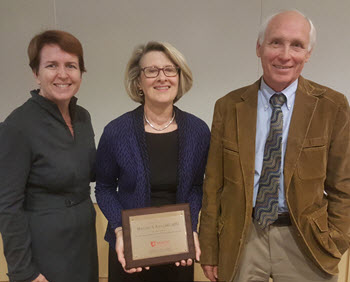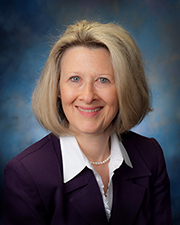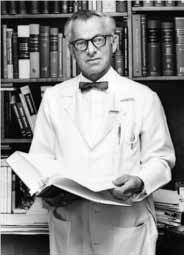The 15th Annual Dr. and Mrs. Maxwell M. Wintrobe Endowed Lecture
Thursday, September 21, 2017

Molly B. Conroy, MD, MPPH; Maragert Ragni, MD, MPH; John R. Hoidal, MD
Novel approaches to treat hemophilia
Margaret V. Ragni, MD, MPH
 Margaret Ragni, MD, MPH is Professor of Medicine and Professor of Clinical and Translational Science at the Department of Medicine, University of Pittsburgh, PA. She is also the Director of the Hemophilia Center of Western Pennsylvania, Pittsburgh, PA. She obtained her medical degree from the School of Medicine at the University of Pittsburgh in 1975, and, in 1993, at the same institution, she received a Master of Public Health (in epidemiology) from the Graduate School of Public Health. From 1975 until 1978, she completed a residency in internal medicine at the Presbyterian Hospital in Pittsburgh, and over the next four years, completed a hematology fellowship at the University of Pittsburgh School of Medicine and a blood bank fellowship at the Central Blood Bank of Pittsburgh. Then, in 1982, she joined the faculty of Pittsburgh University of Medicine, and in 1997 became a Tenured Professor of Medicine. In 1985, she was named a Fellow of the American College of Physicians.
Margaret Ragni, MD, MPH is Professor of Medicine and Professor of Clinical and Translational Science at the Department of Medicine, University of Pittsburgh, PA. She is also the Director of the Hemophilia Center of Western Pennsylvania, Pittsburgh, PA. She obtained her medical degree from the School of Medicine at the University of Pittsburgh in 1975, and, in 1993, at the same institution, she received a Master of Public Health (in epidemiology) from the Graduate School of Public Health. From 1975 until 1978, she completed a residency in internal medicine at the Presbyterian Hospital in Pittsburgh, and over the next four years, completed a hematology fellowship at the University of Pittsburgh School of Medicine and a blood bank fellowship at the Central Blood Bank of Pittsburgh. Then, in 1982, she joined the faculty of Pittsburgh University of Medicine, and in 1997 became a Tenured Professor of Medicine. In 1985, she was named a Fellow of the American College of Physicians.
Dr. Ragni’s main research interests are clinical translational research in congenital hemostasis and thrombosis disorders, for which she has received continuous NIH funding since 1987 as principal or co-investigator. She is involved in new drug clinical trials for hemophilia and Von Willebrand disease, and has authored over 200 peer-reviewed scientific papers. Dr. Ragni also devotes much effort to teaching and has received teaching and mentoring awards in 1998, 2014, and 2016. She serves on the curriculum committee for the division of hematology/oncology fellowship program, and is a member of the FDA Blood Products Advisory Committee and the NHF Medical Scientific Advisory Board. She was past member of the NHLBI Hemostasis/Thrombosis study section, and has co-chaired national educational programs and scientific subcommittees. In 2016, she was recognized as a leader in hematology by the American Journal of Hematology.
Dr. and Mrs. Maxwell M. Wintrobe
 The University of Utah Health Sciences Center is deeply grateful to Susan Wintrobe Walker and her family for their generous gift, which established The Dr. and Mrs. Maxwell M. Wintrobe Endowed Lectureship in Internal Medicine at the University of Utah School of Medicine.
The University of Utah Health Sciences Center is deeply grateful to Susan Wintrobe Walker and her family for their generous gift, which established The Dr. and Mrs. Maxwell M. Wintrobe Endowed Lectureship in Internal Medicine at the University of Utah School of Medicine.
Maxwell M. Wintrobe, MD, was born in 1901. Dr. Wintrobe earned his undergraduate and medical degrees at the University of Manitoba. During his tenure, he was the first Gordon Bell Fellow, and his experiments with pernicious anemia awakened what would become a lifelong love of research – specifically in hematology. Dr. Wintrobe was widely recognized as the “founder” of modern hematology – the study of blood and its disorders. His critically acclaimed textbook, “Clinical Hematology,” published in 1942 filled a major void and served as the “bible” of hematology for more than 50 years. Following appointments at Tulane University in New Orleans and at The Johns Hopkins University School of Medicine in Baltimore, Dr. Wintrobe accepted an offer in 1943 to come west to the newly emerging four-year medical school at the University of Utah and Salt Lake County General Hospital. Dr. Wintrobe held a joint appointment as Professor of Internal Medicine, Chairman of the Department of Medicine, and Physician-in-Chief of University Hospital. When he died in 1986 at the age of 85, his pioneering leadership had propelled the University of Utah School of Medicine into the first rank of American medical schools. He was respected internationally as a prominent physician and outstanding scholar, and was a recipient of the Association of American Physicians coveted Kober Medal. He was also elected to the National Academy of Sciences.
Becky Zanphir Wintrobe was a devoted wife, and accompanied her husband in many travels around the world. She had received her bachelor’s degree in history and German from the University of Manitoba in Canada. Mrs. Wintrobe worked for the Winnipeg Tribune when they met. She later learned laboratory assistant duties and assisted her husband’s research while at The Johns Hopkins University. She was offered a position to run the technical end of a unique diagnostic clinic. At the University of Utah, she proved to be among Dr. Wintrobe’s most valued publication critics, playing an important role in his work. They raised two children, Paul (deceased) and Susan, who worked and retired as an R.N., at the University Hospital. Mrs. Wintrobe passed away in May 2000.